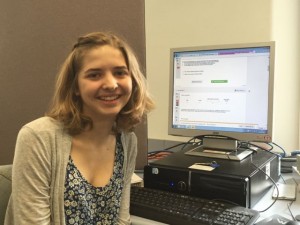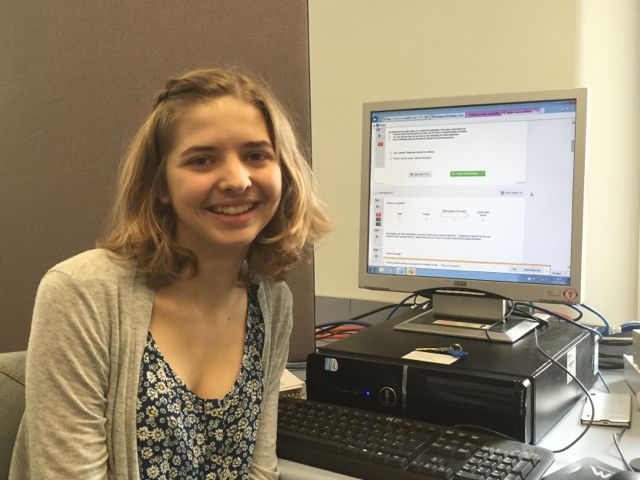 The lab was delighted to host Elena Strobl to work in the lab for 2 weeks over the summer. Elena is completing her school studies in Italy but came to St Andrews to get some experience in working in a Psychology lab. Elena wrote the following of her time in the lab.
The lab was delighted to host Elena Strobl to work in the lab for 2 weeks over the summer. Elena is completing her school studies in Italy but came to St Andrews to get some experience in working in a Psychology lab. Elena wrote the following of her time in the lab.
This summer I had the exciting opportunity to do a two weeks internship with Dr Ken Mavor in the Psychology department of the University of St Andrews. During my time I got the chance to experience the life and work of a social psychologist: how they conduct research, the obstacles they face when testing hypotheses, and the methods they use to analyse their data.
I was intrigued by the idea that we behave differently according to different social contexts and how that ties into everyday life; a prime example being how we stereotype ourselves in routine situations such as job applications or interviews.
Dr Mavor’s work focuses on how self-perception changes over time and differs according to context. Initially I was introduced to different research articles which explored variability, self-complexity and self-cognition. I was intrigued by the idea that we behave differently according to different social contexts and how that ties into everyday life; a prime example being how we stereotype ourselves in routine situations such as job applications or interviews. This helped prepare me for the study I was to help conduct as part of my internship and gave me a glimpse of the skills required to read scientific articles.
Furthermore, I experienced the very challenging work of a social psychologist, consisting of: conducting a study, creating a survey, and analysing the data. The study in question was following up previous research which explored the stability and variability of personality across time and context. This time around I was helping Dr. Mavor improve on a previous study by reassessing the initial survey design. We restructured some of the multiple choice questions by forming new responses using words we had previously categorised into ‘traits’ and ‘states’. Interestingly enough, we ended up using only a small portion of the words we had originally categorized as the rest did not meet the demands of the survey; this showcased the importance of even the smallest details and demonstrated the challenges of study design. After we collected the results we evaluated the data using the statistics software SPSS. Despite my initial concerns regarding my quantitative skills, the data analysis proved much more enjoyable than I had anticipated. In addition to allowing me practical applications of the mathematics I had learned in school, it also taught me new aspects of statistics I had not previously encountered (ex: The effect of outliers and cutting out data).
The incredibly open and supportive way in which people helped each other out and exchanged ideas was electrifying and a joy to experience.
Another aspect I deeply enjoyed throughout this internship was being part of an academic environment. The incredibly open and supportive way in which people helped each other out and exchanged ideas was electrifying and a joy to experience. This is exemplified through the time I spent testing the study of two summer interns which proved both insightful and helpful. I also liked how people with more experience in one field helped others which wanted to work with that area by giving them tips and research material. Further seeing how people exchange their views about certain ideas was very inspiring and something now that I’ve perceived it definitely missing in school life. But I especially think that I’ll extremely miss the open debate and discussion atmosphere which I was part of for two weeks.
In conclusion, this two week internship has been a very important experience: I was involved in designing a study, collecting data, and analysing it. I was also introduced to exciting ideas and new skills. Moreover, I learned a lot of important lessons regarding the work of social psychologists, such as the value of attention to detail, the importance of trial and error, and the significance of research. As a result of this incredible experience I’m even more attracted to psychology as a working career, and hope to study it in greater capacity at university.
Elena.
